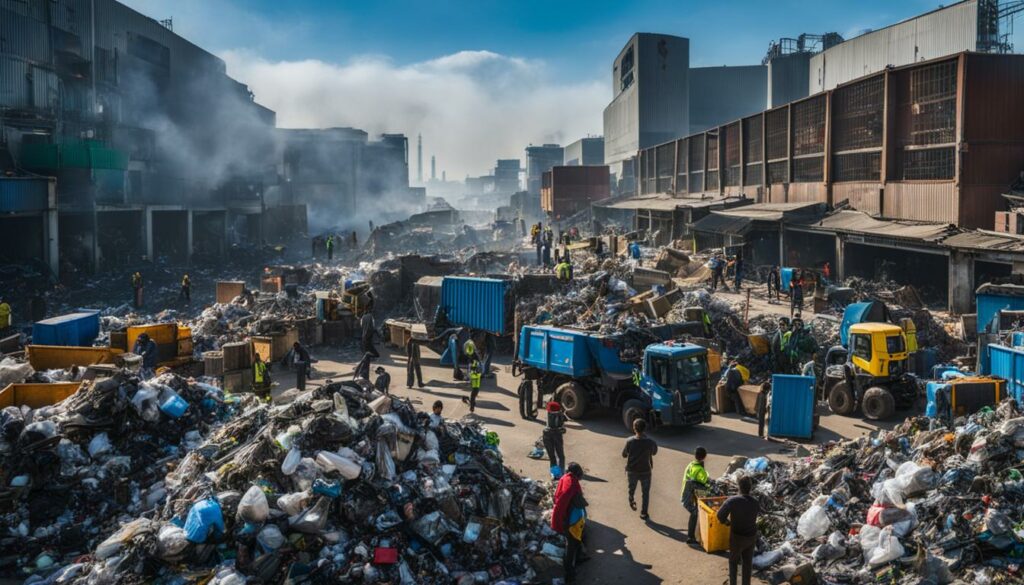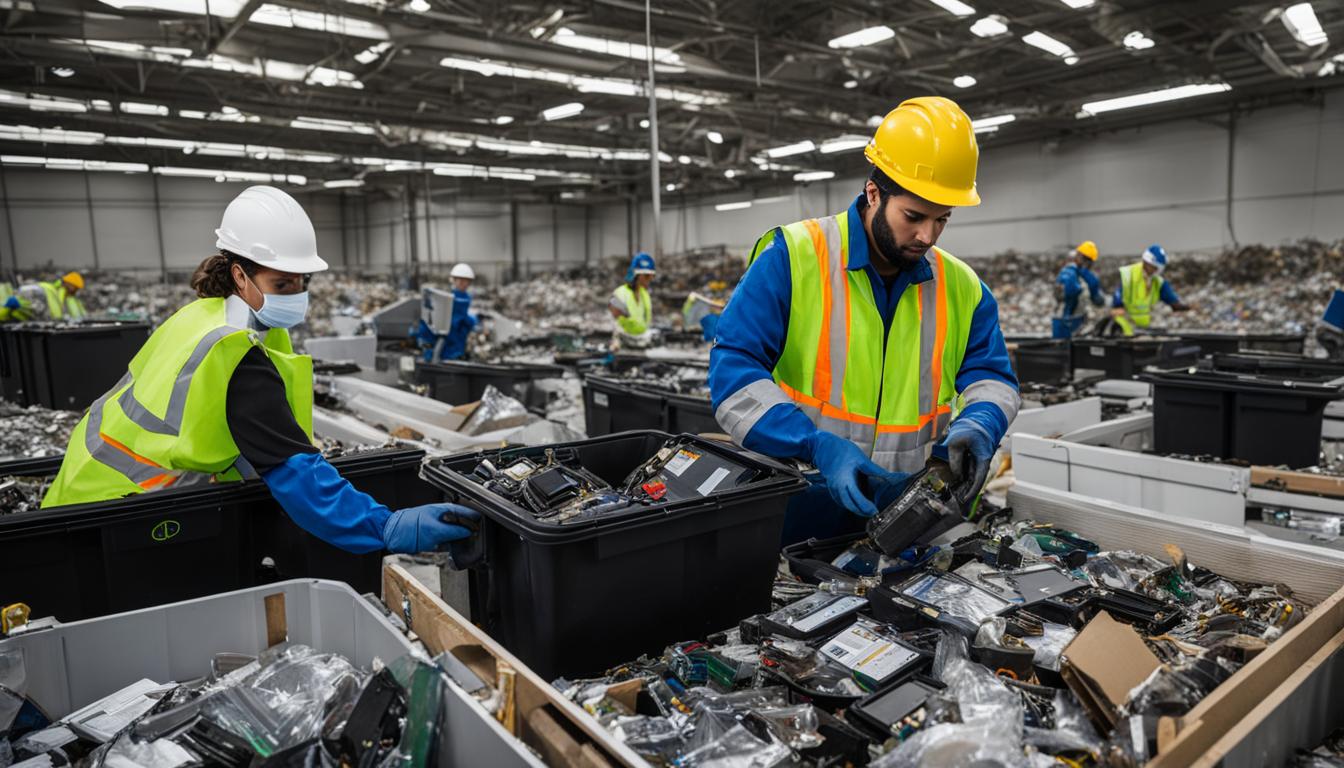Ethical Recycling: Avoiding E-waste Dumping in Developing Countries
Electronic waste (e-waste) has become a pressing environmental issue, contributing to pollution and health risks. The improper disposal of e-waste in developing countries has led to detrimental consequences for both the environment and human well-being. In this article, we will explore the importance of ethical e-waste recycling and environmentally friendly disposal methods to address this global challenge.
With the rapid growth of the electronics industry and the constant upgrading of technology, the generation of e-waste has reached alarming levels. The short lifecycle of electronic equipment and the low recycling rates have resulted in the majority of e-waste being sent to developing countries, particularly the least developed ones. Unfortunately, the handling of e-waste in these countries is often informal and exposes workers to hazardous substances, leading to environmental degradation and health risks.
To mitigate the environmental impact of e-waste and protect human health, it is crucial to prioritize ethical e-waste recycling and environmentally friendly disposal practices. This requires shared responsibility among electronics companies, governments, and consumers, as well as the development of sustainable e-waste management strategies.
Throughout this article, we will delve into the causes of e-waste dumping, the environmental impact of improper disposal, and the current efforts and initiatives in ethical e-waste recycling. We will also highlight the role of government policies, international cooperation, and the importance of public awareness and education in addressing this issue.
Key Takeaways:
- E-waste is a growing environmental problem, with major contributions from developed countries and increasing contributions from rapidly developing countries like China and India.
- The disposal of e-waste in landfills can release toxic chemicals into the environment, posing risks to human health and the ecosystem.
- The causes of e-waste dumping include the quick use and disposal cycle of electronic products, importation from developed countries, and weak infrastructure in developing countries.
- Ethical e-waste recycling requires shared responsibility among electronics companies, countries sending e-waste, consumers, and the governments of developing countries.
- Current efforts in ethical e-waste recycling focus on sustainable management practices, environmentally friendly disposal methods, and international cooperation.
The Environmental Impact of E-waste Dumping
E-waste accumulation is a significant environmental concern, with e-waste accumulating nearly three times faster than other waste. Approximately 53.6 million metric tonnes of e-waste were produced in 2019. The disposal of e-waste in landfills takes up valuable landfill space and can release toxic chemicals into the environment. E-waste contains hazardous substances such as heavy metals and polluting plastics that can harm human health and the environment. The inappropriate handling of e-waste in developing countries results in the discharge of these toxic and hazardous chemicals, contributing to environmental pollution. To mitigate the environmental impact of e-waste, sustainable e-waste management practices, e-waste reduction efforts, and the adoption of green recycling practices are essential.
One of the key consequences of e-waste dumping is the depletion of landfill space. E-waste takes up significant space and continues to accumulate at an alarming rate. Moreover, when e-waste is disposed of in landfills, it can contaminate the surrounding soil and groundwater with toxic substances. Heavy metals such as lead, mercury, and cadmium, which are commonly found in electronic devices, can leach into the soil and eventually make their way into water sources, posing a threat to both ecosystems and human health.
The hazardous substances present in e-waste pose a significant risk to human health and the environment. When improperly disposed of or recycled, these substances can be released into the air, soil, and water, leading to pollution and contamination. For example, when electronic devices are incinerated without proper treatment, toxic gases are emitted, contributing to air pollution. Additionally, the extraction of valuable materials from e-waste through informal recycling methods often involves the use of chemicals that are harmful to both the environment and the workers involved.
| Environmental Impact | Consequences |
|---|---|
| Depletion of landfill space | Less space for non-hazardous waste disposal |
| Soil and groundwater contamination | Release of toxic substances into the environment |
| Air pollution | Emission of toxic gases during improper disposal |
| Health risks | Exposure to hazardous substances for workers and communities |
To address these environmental challenges, sustainable e-waste management practices are needed. This includes implementing e-waste reduction strategies, such as promoting the repair and reuse of electronic devices, as well as responsible recycling methods that prioritize the extraction of valuable materials and the safe disposal of hazardous substances. Governments, electronics companies, and consumers all have a role to play in ensuring the proper management of e-waste and the adoption of green recycling practices. Through collective efforts, we can minimize the environmental impact of e-waste dumping and move towards a more sustainable future.
The Causes of E-waste Dumping
E-waste dumping is a global issue that stems from various causes, including the quick use and disposal cycle of electronic products, the importation of e-waste from developed countries, and the weak infrastructure in developing countries like India.
The constant upgrading of electronic equipment and consumer demand for the latest technology contribute to the generation of e-waste. Often, electronics companies prioritize profit over the recyclability and reusability of their products, leading to a higher volume of discarded devices. Developed countries, including the United Kingdom, are responsible for shipping a significant amount of e-waste to developing countries, taking advantage of weaker regulations and inadequate enforcement.
The weak infrastructure in developing countries makes them attractive dumping sites for e-waste. Many of these countries lack proper recycling facilities and struggle to manage the influx of e-waste. As a result, informal recycling practices are often adopted, exposing workers to hazardous substances and further exacerbating the environmental and health risks associated with e-waste. To address the causes of e-waste dumping, responsible electronics recycling, ethical electronics disposal, and the development of eco-friendly e-waste solutions are necessary.

Table: Comparison of Causes of E-waste Dumping
| Cause | Description |
|---|---|
| Quick use and disposal cycle of electronic products | Constant upgrading of electronic equipment and consumer demand for the latest technology lead to a higher volume of discarded devices. |
| Importation of e-waste from developed countries | Developed countries, including the United Kingdom, take advantage of weaker regulations in developing countries and ship a significant amount of e-waste to these locations. |
| Weak infrastructure in developing countries | Lack of proper recycling facilities and inadequate enforcement in developing countries make them attractive dumping sites for e-waste. |
Shared Responsibility for Ethical E-waste Recycling
E-waste recycling is a shared responsibility that extends to electronics companies, countries, consumers, and governments. Each stakeholder has a crucial role to play in ensuring ethical and responsible disposal of electronic waste. By working together and adopting green recycling practices, we can tackle the growing problem of e-waste and protect the environment.
Electronics companies have a significant role in promoting ethical e-waste recycling. They should prioritize sustainable design and responsible disposal of their products. This includes using materials that are easily recyclable, implementing take-back programs, and supporting the development of eco-friendly e-waste solutions. By taking these steps, electronics companies can reduce the environmental impact of their products and contribute to a circular economy.
Countries that export e-waste should take responsibility for managing their waste within their own borders. It is essential for developed countries to ensure that their e-waste is properly recycled and disposed of. This can be achieved by investing in recycling infrastructure, enforcing regulations, and collaborating with developing countries to prevent the illegal exportation of hazardous waste. By taking these measures, countries can set a positive example and lead the way in ethical e-waste management.
Consumers also have an essential role in responsible e-waste recycling. By disposing of their electronic devices at designated recycling centers, they can ensure that valuable materials are recovered and harmful substances are disposed of safely. It is crucial to raise awareness among consumers about the importance of responsible electronics recycling and the availability of recycling facilities. By making informed choices and actively participating in e-waste recycling, consumers can contribute to a sustainable future.
| Stakeholder | Responsibilities |
|---|---|
| Electronics Companies | Prioritize sustainable design and responsible disposal of products Implement green recycling practices Support the development of eco-friendly e-waste solutions |
| Countries Exporting E-waste | Manage e-waste within their own borders Invest in recycling infrastructure Enforce regulations Prevent illegal exportation of hazardous waste |
| Consumers | Dispose of electronic devices at designated recycling centers Raise awareness about responsible electronics recycling |
“Ethical e-waste recycling requires the collective efforts of electronics companies, countries, consumers, and governments. By sharing the responsibility and adopting eco-friendly practices, we can create a sustainable future and protect our planet from the adverse effects of e-waste.”
The Importance of Government Regulations
Government policies and regulations are instrumental in promoting electronic waste recycling and sustainable e-waste management. National policies should enforce proper e-waste disposal and recycling practices, ensuring that electronics companies meet their environmental obligations. Governments must allocate resources for the development of recycling infrastructure and the enforcement of regulations. Additionally, international cooperation is essential to address the transboundary movement of e-waste and prevent the illegal exportation of hazardous waste. Through government regulations and international cooperation, we can establish a comprehensive framework for ethical e-waste recycling.
- Electronics companies should prioritize sustainable design and responsible disposal of their products.
- Countries exporting e-waste must manage it within their own borders and prevent illegal exportation.
- Consumers play a crucial role in responsible e-waste recycling by disposing of their devices at designated recycling centers.
- Government policies and international cooperation are necessary to enforce proper e-waste disposal and recycling practices.
By recognizing the shared responsibility and taking collective action, we can move towards a future where electronic waste is recycled ethically, green recycling practices are the norm, and eco-friendly e-waste solutions are widely adopted. Let us all play our part in protecting the environment and creating a sustainable world.
The Current Efforts in Ethical E-waste Recycling
Efforts to address the ethical concerns surrounding e-waste recycling have gained significant momentum in recent years. Stakeholders, including governments, organizations, and individuals, are actively working towards sustainable e-waste management and environmentally friendly disposal. These initiatives aim to minimize the adverse environmental and health impacts associated with improper e-waste disposal.
One key focus of current efforts is the implementation of sustainable e-waste management practices. This involves adopting strategies that prioritize the reduction, reuse, and recycling of electronic waste. Governments and organizations are collaborating to establish recycling facilities and closed-loop recycling systems. These facilities ensure that e-waste is properly managed and recycled, reducing the need for landfill space and minimizing the release of toxic chemicals into the environment.
The development of regulatory frameworks and legislation further supports ethical e-waste recycling. The Basel Convention and the Bamako Convention provide guidelines for the control and management of hazardous waste, including e-waste. Many countries, particularly those in the European Union, have enacted legislation to address e-waste disposal and recycling, enforcing responsible practices. Such policies play a crucial role in promoting sustainable e-waste management and holding stakeholders accountable for their actions.
Collaboration between governments, electronics companies, and recycling organizations is also essential in improving the efficiency and effectiveness of ethical e-waste recycling. By working together, these stakeholders can develop innovative solutions, share best practices, and overcome challenges in the recycling process. This cooperation ensures that e-waste is managed in a responsible and environmentally friendly manner.
| Sustainable E-waste Management Efforts | Impact |
|---|---|
| Introduction of closed-loop recycling systems | Reduces the need for raw materials and minimizes environmental impact |
| Establishment of recycling facilities | Enables proper e-waste management and recycling |
| Enactment of legislation and regulations | Promotes responsible e-waste disposal practices and holds stakeholders accountable |
| Collaboration between stakeholders | Fosters innovation, knowledge sharing, and effective solutions |
Overall, the current efforts in ethical e-waste recycling are driving positive change in the industry. With sustainable e-waste management practices, the establishment of recycling facilities, and international cooperation, progress is being made towards a more environmentally friendly approach to e-waste disposal. However, there is still much work to be done to ensure that e-waste is responsibly managed and that the global community collectively addresses this pressing issue.
The Importance of Public Awareness and Education
Public awareness and education play a crucial role in promoting responsible electronics recycling and sustainable e-waste management. Many individuals are not fully aware of the environmental and health impacts associated with improper e-waste disposal. By educating the public about the importance of recycling electronic devices and providing information about designated recycling centers, we can encourage responsible disposal practices.
Through awareness campaigns, educational programs, and information dissemination, we can raise awareness about the need for ethical e-waste recycling. By highlighting the environmental and health benefits of sustainable e-waste management, we can motivate individuals to take action and make responsible choices when it comes to their electronic waste.
To illustrate the significance of public awareness and education, consider the following quote from an industry expert: “Responsible electronics recycling is not just the responsibility of a few; it is the collective responsibility of all individuals, governments, and organizations. By spreading awareness and educating the public, we can create a culture of sustainability and ensure the proper management of e-waste.”
The Role of Government Policies and International Cooperation
Government policies and international cooperation play a vital role in promoting electronic waste recycling and sustainable e-waste management. National policies and regulations should be in place to enforce proper e-waste disposal and recycling practices. Governments should allocate resources for the development of recycling infrastructure and the enforcement of regulations to ensure the responsible handling of e-waste.
International cooperation is essential to address the transboundary movement of e-waste and prevent the illegal exportation of hazardous waste to developing countries. The Basel Convention and other international frameworks provide a platform for countries to collaborate and share best practices in e-waste recycling and management. By working together, governments can create a global framework for ethical e-waste recycling and promote sustainable practices.
| Government Policies | International Cooperation |
|---|---|
| Enforce proper e-waste disposal and recycling practices | Address transboundary movement of e-waste |
| Allocate resources for recycling infrastructure development | Prevent illegal exportation of hazardous waste |
| Enforce regulations for responsible e-waste handling | Collaborate and share best practices |

In conclusion, public awareness and education are crucial in promoting responsible electronics recycling and sustainable e-waste management. By spreading awareness, educating the public, and highlighting the importance of ethical e-waste recycling, we can create a culture of sustainability and ensure the proper management of e-waste. In addition, government policies and international cooperation are essential in enforcing regulations, developing recycling infrastructure, and addressing the global issue of e-waste. Together, we can work towards a more sustainable future for our planet.
The Role of Government Policies and International Cooperation
Governments play a crucial role in promoting electronic waste recycling and sustainable e-waste management through the implementation of policies and regulations. National policies should focus on enforcing proper e-waste disposal practices and incentivizing responsible recycling. Governments need to allocate resources for the development of recycling infrastructure and the enforcement of regulations, ensuring that e-waste is managed in an environmentally friendly manner. By taking a proactive approach, governments can significantly reduce the negative impacts of e-waste on the environment and public health.
International cooperation is also essential in addressing the global issue of e-waste. The Basel Convention and other international frameworks provide a platform for countries to collaborate and share best practices in e-waste recycling and management. By sharing knowledge and experiences, countries can develop effective strategies to handle e-waste responsibly and prevent the illegal exportation of hazardous waste to developing countries. International cooperation can also help establish common standards for e-waste recycling, ensuring consistency and promoting sustainable practices worldwide.
“Effective e-waste management requires a collective effort from governments, industries, and consumers. By working together, we can create a sustainable future and protect our planet from the harmful effects of e-waste.”
The Importance of Government Policies
Government policies play a crucial role in creating a conducive environment for electronic waste recycling. By implementing legislation that regulates the disposal and recycling of e-waste, governments can establish a clear framework for responsible e-waste management. These policies can include requirements for electronics manufacturers to design products with recycling in mind, as well as regulations on the proper disposal of electronic devices.
Additionally, governments can provide financial incentives and support for the development of recycling infrastructure. By investing in recycling facilities and supporting research and development in eco-friendly e-waste solutions, governments can create opportunities for sustainable growth in the recycling industry.
- Effective enforcement of regulations
- Financial support for recycling infrastructure
- Incentives for electronics manufacturers to design recyclable products
- Research and development of eco-friendly e-waste solutions
International Cooperation for Sustainable E-waste Management
International cooperation is crucial to address the transboundary movement of e-waste and prevent the illegal exportation of hazardous waste to developing countries. Through collaboration and information sharing, countries can learn from each other’s experiences and develop effective strategies to tackle e-waste on a global scale.
International organizations such as the United Nations Environment Programme (UNEP) and the International Telecommunication Union (ITU) play a vital role in facilitating cooperation and coordinating efforts among countries. These organizations provide platforms for countries to share best practices, develop common standards, and implement joint initiatives to promote sustainable e-waste management.
By working together, governments can create a global framework for ethical e-waste recycling and promote sustainable practices. This collective effort is essential to safeguard the environment, protect public health, and create a circular economy for electronic waste.
Conclusion
Ethical e-waste recycling is vital for avoiding the dumping of electronic waste in developing countries. The environmental and health impacts of improper e-waste disposal are significant and require immediate attention. To address this global issue, responsible electronics recycling, sustainable e-waste management, and environmentally friendly disposal methods are needed.
Collaboration among electronics companies, governments, and consumers is essential to ensure that e-waste is properly recycled and disposed of. Public awareness and education play a crucial role in promoting ethical e-waste recycling practices, and government policies are necessary to enforce proper disposal and recycling practices.
Furthermore, international cooperation is vital in addressing the transboundary movement of e-waste and preventing the illegal exportation of hazardous waste to developing countries. By working together, governments can establish a global framework for ethical e-waste recycling, safeguarding the environment and public health.
FAQ
What is e-waste?
E-waste refers to electronic waste, which includes discarded electronic devices such as computers, mobile phones, televisions, and other electronic equipment.
What is ethical e-waste recycling?
Ethical e-waste recycling refers to the responsible and sustainable management of electronic waste, including proper disposal, recycling, and minimizing the environmental and health impacts of e-waste.
Why is e-waste dumping a problem?
E-waste dumping poses environmental and health risks as it can release toxic chemicals into the environment, pollute landfills, and harm workers involved in informal recycling practices.
Who is responsible for e-waste recycling?
E-waste recycling is a shared responsibility among electronics companies, countries generating e-waste, consumers, and the governments of developing countries.
What are sustainable e-waste management practices?
Sustainable e-waste management practices involve recycling electronic devices, reusing components, reducing e-waste generation, and adopting environmentally friendly disposal methods.
How can I dispose of my electronic devices responsibly?
You can dispose of your electronic devices at designated recycling centers or through electronics recycling programs provided by manufacturers or local authorities.
What are the environmental impacts of improper e-waste disposal?
Improper e-waste disposal can lead to pollution, contamination of soil and water, and the release of hazardous substances, which can harm the environment and human health.
What is the role of government policies in e-waste recycling?
Government policies are crucial in enforcing proper e-waste disposal and recycling practices, allocating resources for recycling infrastructure, and preventing the illegal exportation of hazardous waste.
How can public awareness and education contribute to ethical e-waste recycling?
Public awareness and education can promote responsible electronics recycling by informing individuals about the environmental and health impacts of improper e-waste disposal and the availability of recycling centers.
Why is international cooperation important in e-waste recycling?
International cooperation is necessary to address the transboundary movement of e-waste, prevent illegal exportation, and share best practices in e-waste recycling and management.















